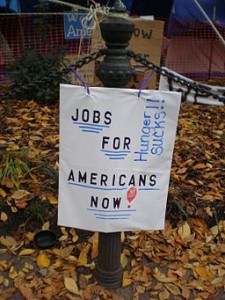This session introduces Progress & Poverty, including an overview of what we cover in the course. Even if you don’t plan to take the full course, you can expect this introductory session to help you gain a new and useful perspective on today’s problems of wealth concentration, poverty, and lack of opportunity.
America in the 1870s faced increasing poverty, rising unemployment, rule by an elite and their corporations– many of the same problems we’re experiencing today. Henry George described the cause of these problems and proposed a remedy which is even more applicable today than it was in his time. His book Progress & Poverty, perhaps the best-selling nonfiction book of the 19th century, presented his analysis and solution.
In this “classic” version of the course, students are encouraged to read the original 1879 text, and/or modern summaries and supplements, and to evaluate what George says against their own experience and understanding. You’ll gain a new understanding of how the economy works, which public policies promote liberty and prosperity, and which don’t.
Class meets every Tuesday, beginning 6:15PM on January 19, ending March 22. More information about the course is here and here. Pre-registration is helpful but not required.
[Please note: There is no need to stay the full 3½ hours of this event. Come when you’d like and leave when you wish. ]
How much stuff do you think you “own,” but really only have a limited license to use in specific ways? You may be surprised to learn who is restricting your freedom to innovate and share information. As software-driven products become more common, how can you be sure that your possessions aren’t working against you? Is that the price we have to pay to live in an advanced economy? It need not be.
Find out how software freedom fits into the “liberty means justice” political economy that we teach, why and how we use open source software wherever possible (and it almost always is). Discussion and videos presented in cooperation with the Free Software Foundation.
Meanwhile, to learn more about DRM and why it might be a bad thing, visit Defective by Design.

International trade has been a continuing issue throughout our history. The issues Henry George confronted in the late 19th century were similar to those raised in the recent election. His careful analysis showed that both sides were wrong, and proposed a trade policy to raise real wages of working Americans.
Despite huge social, technological, and demographic changes since George’s time, his analysis requires only very minor updates, and concludes that today, again, both sides are wrong. Take this opportunity to understand and evaluate for yourself a proposal to achieve widespread prosperity, here and now, thru True Free Trade.
This free presentation by Henry George School instructor Chuck Metalitz is adapted from our “Protection or Free Trade” course.

Decades before Wealth of Nations, Adam Smith wrote what he seems to have considered a superior work, Theory of Moral Sentiments. He wrote:
How selfish soever man may be supposed, there are evidently some principles in his nature, which interest him in the fortune of others, and render their happiness necessary to him, though he derives nothing from it except the pleasure of seeing it.
Wikipedia asserts:
Smith critically examines the moral thinking of his time, and suggests that conscience arises from dynamic and interactive social relationships through which people seek “mutual sympathy of sentiments.”[74] His goal in writing the work was to explain the source of mankind’s ability to form moral judgement, given that people begin life with no moral sentiments at all. Smith proposes a theory of sympathy, in which the act of observing others and seeing the judgements they form of both others and oneself makes people aware of themselves and how others perceive their behaviour.
The Theory of Moral Sentiments has been printed in numerous editions, and is also available free on line. Smith revised the book throughout his lifetime; it’s best to avoid the first edition, and choose one published after his death in 1790.
In this session we’ll discuss parts 1-3 of the book, taking up parts 4-7 on November 20,

